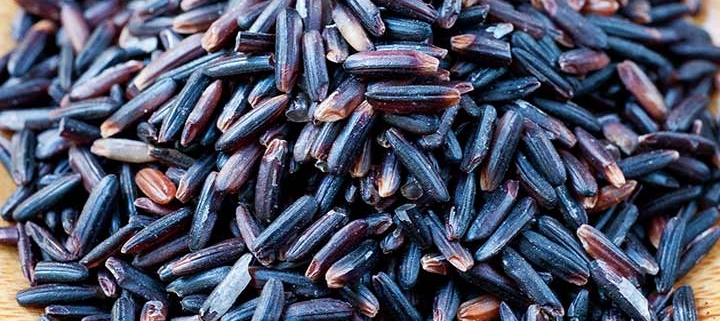Forbidden Black rice
Forbidden Black rice only takes thirty minutes to cook and it is delicious. I add chopped tomatoes, onion, parsley, lemon and a whole avocado. Sometimes I will add lentils as well. This is a complete main meal.
Legend has it, that in China there was a special, heirloom variety of rice grown exclusively for the Emperor. This variety of rice was the rice we know today as black rice or emperor’s rice. Black rice was cultivated in small amounts, in specially designated fields, by highly trusted servants and its seeds were guarded day and night. It was strictly forbidden for anyone, but the emperor, to consume this variety of rice.
The reason black rice was so highly valued, and closely guarded, by the Chinese emperors, was because in ancient Chinese medicine, which relies heavily on the philosophy “food is medicine and medicine is food” black rice is seen as the main source of good health and longevity. In ancient days, black rice was viewed as the mystical source of the emperors’ good health and longevity and was consumed as a tonic. Therefore, anyone caught cultivating or consuming this rice was believed to be sabotaging or “stealing” the source of good health and longevity reserved especially for the emperor and thus was punished, severely.
Luckily, times have changed and no one will be punished today for consuming black rice. Though highly popular in Thailand and Indonesia, black rice is not a stable source of carbohydrates in most rice-consuming cultures such as the Indian culture and the Arabic and Persian cultures. That is mostly due to the fact that the Greeks banned the cultivation, importation, and consumption of black rice when they conquered the Middle East because they believed that the consumption of this food helped their enemies in battle. They did not, however, ban white rice, which they deemed worthless. As a result, India, one of the largest exporters of rice to the Middle East, both then and now, stopped the cultivation of black rice due to lack of demand. Therefore, white rice replaced black rice as the dominant source of carbohydrates in all Middle Eastern cultural cuisines. Due to events such as these, black rice, a food once highly revered by the world’s most powerful figures, faded into oblivion.
Though there is still a lot we do not know about the health benefits of black rice, a series of scientific studies have labeled it “The Long-Lost Superfood”, a treasure house of antioxidants, fiber, nutrients, minerals and amino acids capable of combating and preventing a host of health problems ranging from cancer, diabetes, and heart disease to Alzheimer’s. Apparently, the emperor’s of ancient China was right.
The black, outer layer of this rice, contains antioxidant-rich bran. The purple and reddish pigment of this rice, which gives it its black appearance, contains Anthocyanins, the same antioxidants found in such prominent superfoods as blueberries, Acai berries, and grapes. credited to doug Veganhurt

 no
no NO
NO no
no
Leave a Reply
Want to join the discussion?Feel free to contribute!